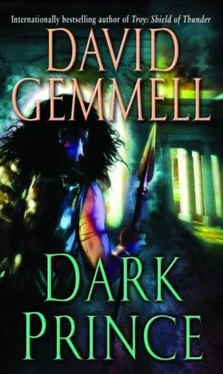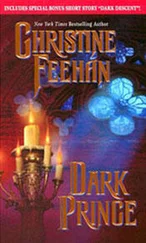David Gemmell - Dark Prince
Здесь есть возможность читать онлайн «David Gemmell - Dark Prince» весь текст электронной книги совершенно бесплатно (целиком полную версию без сокращений). В некоторых случаях можно слушать аудио, скачать через торрент в формате fb2 и присутствует краткое содержание. Год выпуска: 2011, ISBN: 2011, Издательство: Hachette UK, Жанр: Старинная литература, на английском языке. Описание произведения, (предисловие) а так же отзывы посетителей доступны на портале библиотеки ЛибКат.
- Название:Dark Prince
- Автор:
- Издательство:Hachette UK
- Жанр:
- Год:2011
- ISBN:9781405512107
- Рейтинг книги:4 / 5. Голосов: 1
-
Избранное:Добавить в избранное
- Отзывы:
-
Ваша оценка:
- 80
- 1
- 2
- 3
- 4
- 5
Dark Prince: краткое содержание, описание и аннотация
Предлагаем к чтению аннотацию, описание, краткое содержание или предисловие (зависит от того, что написал сам автор книги «Dark Prince»). Если вы не нашли необходимую информацию о книге — напишите в комментариях, мы постараемся отыскать её.
Dark Prince — читать онлайн бесплатно полную книгу (весь текст) целиком
Ниже представлен текст книги, разбитый по страницам. Система сохранения места последней прочитанной страницы, позволяет с удобством читать онлайн бесплатно книгу «Dark Prince», без необходимости каждый раз заново искать на чём Вы остановились. Поставьте закладку, и сможете в любой момент перейти на страницу, на которой закончили чтение.
Интервал:
Закладка:
Book One, 352 BC
Pella, Macedonia, Summer
The golden-haired child sat alone, as he usually did, and wondered whether his father would die today. Some distance away, across the royal gardens, his nurse was talking to the two sentries who guarded him during the hours of daylight. The soldiers, grim-eyed warriors, did not look at him and shifted nervously if he approached.
Alexander was used to this reaction. Even at four he understood it.
He remembered with sadness the day three weeks ago when his father, garbed for war, had walked along this same garden path, his cuirass gleaming in the sunlight. It was so beautiful that Alexander had reached out to touch the gleaming plates of iron, edged with gold, the six golden lions on the breast. But as his hand came forward Philip had moved swiftly back.
'Don't touch me, boy!' he snapped.
'I would not hurt you, Father,' whispered the prince, staring up at the black-bearded face, with its blind right eye like a huge opal beneath the savagely scarred brow.
'I came to say goodbye,' muttered Philip, 'and to tell you to be good. Learn your lessons well.'
'Will you win?' the child asked.
'Win or die, boy,' answered the King, kneeling to face his son. He appeared to relax, though his expression remained stern. 'There are those who think I cannot win. They remember Onomarchus defeated me when last we met. But.
.'his voice dropped to a whisper, 'when the arrow tore into my eye at the siege of Methone they said I would die.
When the fever struck me down in Thrace men swore my heart stopped beating. But I am Macedon, Alexander, and I do not die easily.'
'I don't want you to die. I love you,' said the child.
For a moment only Philip's face softened, his arm rising as if to reach out to his son. But the moment passed and the King stood. 'Be good,' he said. 'I will. . think of you.'
The sound of children's laughter brought Alexander's thoughts back to the present. Beyond the garden walls he could hear the palace children playing. Sighing, he wondered what game they were enjoying. Hunt the Turtle perhaps, or Hecate's Touch. He watched them sometimes from the window of his room. One child would be chosen as Hecate, Goddess of Death, and would chase the others, seeking out their hiding-places, to touch them and make them slaves.
The game would go on until all the children had been found and enslaved by Death.
Alexander shivered in the sunshine. No one would ask him to play such a game. He looked down at his small hands.
He had not meant the hound to die; he had loved the pup. And he had tried so hard, concentrating always, so that whenever he stroked the dog his mind was calm. But one day the playful hound had leapt at him, knocking him from his feet. In that moment Alexander's hand had snaked out, lightly slapping the beast on the neck. The hound collapsed instantly, eyes glazing, legs twitching. It had died within seconds, but what was worse it had decomposed within minutes, the stench filling the garden.
'It was not my fault,' the child wanted to say. But he knew that it was; knew that he was cursed.
Birds began to sing in the tall trees and Alexander smiled as he looked up at them. Closing his green eyes the boy allowed the bird-song to flow into him, filling his mind, merging with his own thoughts. The songs began to have meanings then, that he could just decipher. No words but feelings, fears, tiny angers. The birds were screeching warnings to one another.
Alexander looked up and sang: 'My tree! My tree! Get away! Get away! My tree! My tree! I will kill you if you stay!'
'Children should not sing of killing,' said his nurse sternly, approaching where he sat but halting, as ever, out of reach.
'That is what the birds are singing,' he told her.
'You should come inside now, the sun is very hot.'
'The children are still playing beyond the wall,' he argued. 'And I like to sit here.'
'You will do as you are told, young prince!' she snapped. His eyes blazed and he could almost hear the dark voice within himself whispering: 'Hurt her! Kill her!' He swallowed hard, quelling the rising tide of anger.
'I will come,' he said softly. Rising to his feet he walked towards her, but she stepped quickly aside to let him pass, following him slowly as he returned to his own rooms. Waiting until she had gone, Alexander slipped out into the corridor and ran to his mother's apartments, pushing open the door to peek inside.
Olympias was alone and she smiled as he entered, opening her arms to him. He ran forward and embraced her, pushing his face against the soft flesh of her bosom. There was never anyone, he knew, so beautiful as his mother, and he clung to her fiercely.
'You are very hot,' said Olympias, pushing back his golden hair and stroking his brow. Filling a cup with cool water she passed it to him, watching as he drank greedily.
'Did your lessons go well today?' she asked.
'There were no lessons, Mother. Stagra is ill. If I had a pony, would it die?'
He saw the pain on her face as pulling him to her she patted his back. 'You are not a demon, Alexander. You have great gifts; you will be a great man.'
'But would the pony die?'
'I think that it might,' she admitted. 'But when you are older you will know how to control. . the Talent. Be patient.'
'I don't want to kill anything. Yesterday I made a bird fly to my hand. It sat for a long time before flying away. It didn't die. Truly!'
'When your father returns to Pella we will all go to the sea, and sail on boats. You will like that. The breeze is cool, and we will swim.'
'Is he coming back?' Alexander asked. 'Some people say he will die against the Phocians. They say his luck is finished, that the gods have deserted him.'
'Hush!' she whispered. 'It is not wise to voice such thoughts. Philip is a great warrior — and he has Parmenion.'
'The Phocians beat him before, two years ago,' said the boy. 'Two thousand Macedonians dead. And now the Athenians raid our coastline and the Thracians have turned against us.'
She nodded and sighed. 'You hear too much, Alexander.'
'I don't want him to die… even though he doesn't like me.'
'You must not say that! Ever!' she cried, seizing his shoulders and shaking him hard. 'Never! He loves you. You are his son. His heir.'
'You are hurting me,' he whispered, tears in his eyes.
'I am sorry,' she told him, drawing him into her arms. 'There is so much I wish I could tell you; explain to you. But you are very young.'
'I would understand,' he assured her.
'I know. That is why I cannot tell you.'
For a while they sat in silence, Alexander warm and sleepy in his mother's arms. 'I can see them now,' he said dreamily. 'There is a plain covered with flowers of purple and yellow. And there is Father in his golden armour. He is standing beside the grey gelding, Achea. And there are the enemy. Oh, Mother, there are thousands of them. I can see their shields. Look! There is the sign of Sparta, and there the Owl of Athens and… I don't know that one, but I can see the emblems of Pherai and Corinth… so many. How can Father beat them all?'
'I don't know,' whispered Olympias. 'What is happening now?'
'The battle begins,' answered the child.
The Crocus Field, Summer
Philip of Macedon rubbed at the scar above his blinded right eye and stared out over the Phocian battle-lines half a mile ahead. More than 20,000 infantry were massed on the plain, 1,000 cavalry behind and to the right of the main force. He transferred his gaze to the Macedonian lines, where 15,000 foot-soldiers waited in formation at the centre, his 3,000 cavalry to the left and right.
Everywhere there were flowers growing, some purple and yellow, others white and pink, and hi that moment it seemed to the King almost inconceivable that within minutes hundreds — perhaps thousands — of men would lay down their lives, their blood soaking into the earth. And he felt, with sudden regret, it was almost as great a crime against the gods of beauty that these flowers would soon be trampled into the dust beneath the pale grass of the Grecian Plain. 'Don't be foolish,' he told himself. 'You chose this battle-ground.' It was flat and made for cavalry and Philip now commanded the Thessalian lancers, the finest horse-soldiers in Greece.
Читать дальшеИнтервал:
Закладка:
Похожие книги на «Dark Prince»
Представляем Вашему вниманию похожие книги на «Dark Prince» списком для выбора. Мы отобрали схожую по названию и смыслу литературу в надежде предоставить читателям больше вариантов отыскать новые, интересные, ещё непрочитанные произведения.
Обсуждение, отзывы о книге «Dark Prince» и просто собственные мнения читателей. Оставьте ваши комментарии, напишите, что Вы думаете о произведении, его смысле или главных героях. Укажите что конкретно понравилось, а что нет, и почему Вы так считаете.












